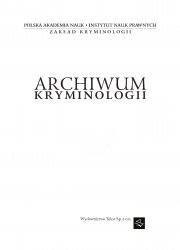Przestępczość i reformy wymiaru sprawiedliwości w „nowych państwach środkowoeuropejskich” na przykładzie Czech
Criminality and Criminal Justice Reforms in the ‘New Central European Countries’ on the Example of the Czech Republic
Author(s): Helena Válková, Jana HulmákováSubject(s): Law, Constitution, Jurisprudence
Published by: Instytut Nauk Prawnych PAN
Keywords: criminal justice;criminality;reforms;restoriative justice;
Summary/Abstract: The victimological research and their results revealed myths about the alleged need of the crime victims to seek revenge on the offenders for the injustice suffered. On the contrary, they showed that a vast majority of victims is concerned more about obtaining quickly, ideally informally, moral and also material satisfaction. Therefore, in the last two decades of the 20th century, the efforts made by experts from the criminal policy area, practice and academic work sites grow stronger in order to find alternative ways / paradigm to traditional criminal reaction to a crime. This effort was channelled into a movement now known as the restorative justice that brought a visible success for the crime victims both at the level of adopting new legislative measures and providing practical assistance while solving and eliminating the consequences caused by a specific criminal act. Concurrently, it opened space for further research focussed on identification of a real contribution of the restorative procedures and programmes for the crime victims, including the risks of their potential 'abuse' for these purposes.Despite a number of more or less important reforms, the Czech Republic has failed as opposed to other post-communist countries (including Slovakia) to adopt a new criminal law until the present time. Therefore, the criminal law from 1961 was amended more than 50 times between 1989 until yet. Currently, a draft of the new criminal law is being discussed in the Parliament, however, everything points to the fact there is not a enough of political will for its adoption. Nevertheless, it would be interesting to mention some of the most important changes that the new law would bring from the criminal point of view.The new Code abandons the existing material and formal concept of the criminal act (degree of danger for society) and replaces it by a formal concept. Besides this substantial conceptual intervention, a series of other important changes are taking place in the area of the criminal liability, for example: a new categorising of criminal acts, new legal concepts of error in facts and error in law, introducing a new institute of gross negligence, a new definition of indirect offender, extremely dangerous recidivist, precision of definitions covering circumstances eliminating illegality of a act (extreme necessity, necessary self-defence, admissible risk, etc).
Journal: Archiwum Kryminologii
- Issue Year: 2006
- Issue No: XXVIII
- Page Range: 111-128
- Page Count: 18
- Language: Polish

